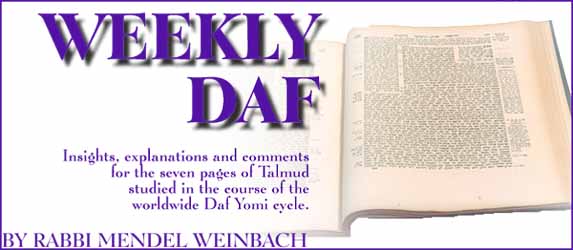Weekly Daf #82
Shavuos 7-13 -- Issue #82
4-10 Elul 5755 / 30 August-5 September.
This publication is also available in the following formats:
Yom Kippur Without Repentance?
Yom Kippur brings atonement only to those who repent their sins. This is the majority opinion of the Sages which constitutes the halacha.The dissenting view of the Sage Rebbie - that except for three sins, atonement is achieved on Yom Kippur even without repentance - raises an interesting problem. How can the Torah state that a Jew who intentionally eats on Yom Kippur is subject to kares (extirpation) if his sin is immediately atoned for on that very day?
Three solutions are offered by the Talmud:
- Rebbie differentiated between sins committed in connection with Yom Kippur itself and other sins, conceding that one who eats on Yom Kippur and fails to repent does not achieve atonement.
- Rebbie makes no such distinction but applies the Torah's penalty
of kares for one who eats on Yom Kippur to one of these
two situations:
- He ate a chunk of meat and choked on it so that there was not one moment of Yom Kippur between his sin and his death.
- He ate at the very end of Yom Kippur so that no moment of the holy day passed following his sin.
A Sin-Offering for Hashem?
Why is the goat offering of Rosh Chodesh the only sacrifice of its kind referred to as "a sin-offering for Hashem?"Two seemingly diverse Talmudical interpretations dovetail to supply the answer.
"Let this goat be an atonement," Rabbi Shimon ben Lakish explains the reasoning of Hashem, "for My reducing the light of the moon."
The Talmud (Chulin 60b) relates the efforts of Hashem to placate the moon after ordering it to reduce its light as a response to that luminary's challenge that there was no room in the universe for two heavenly luminaries of similar power. Jews would calculate their calendar according to the moon and tzadikkim such as Yacov, Shmuel and David would be called "small" in association with the lesser light of the moon. When all of this failed to completely appease the moon Hashem ordered Israel to bring a sin offering on the New Moon. The atonement of this sacrifice, points out Rabbi Yehuda, is essentially for those sins of entering the Sanctuary or eating sacrificial flesh while in a state of impurity of which one never becomes aware. "A sin-offering for Hashem" means a sin which only Hashem is aware of. Hashem wished to give Israel this opportunity for atonement, explains Tosefos, and designated Rosh Chodesh, the Festival of the New Moon, as the time for offering it in order to placate the moon for its reduction of light.
General Editor: Rabbi Moshe Newman
Production Design: Lev Seltzer
HTML Design: Michael Treblow
HTML Assistant: Simon Shamoun
© 1995 Ohr Somayach International - All rights reserved. This publication may be distributed to another person intact without prior permission. We also encourage you to include this material in other publications, such as synagogue newsletters. However, we ask that you contact us beforehand for permission, and then send us a sample issue.
This publication is available via E-Mail
Ohr Somayach Institutions is an international network of Yeshivot and outreach centers, with branches in North America, Europe, South Africa and South America. The Central Campus in Jerusalem provides a full range of educational services for over 685 full-time students.
The Jewish Learning Exchange (JLE) of Ohr Somayach offers summer and winter programs in Israel that attract hundreds of university students from around the world for 3 to 8 weeks of study and touring.
Ohr Somayach's Web site is hosted by TeamGenesis
Dedication opportunities are available for Weekly Daf. Please contact us for details.







